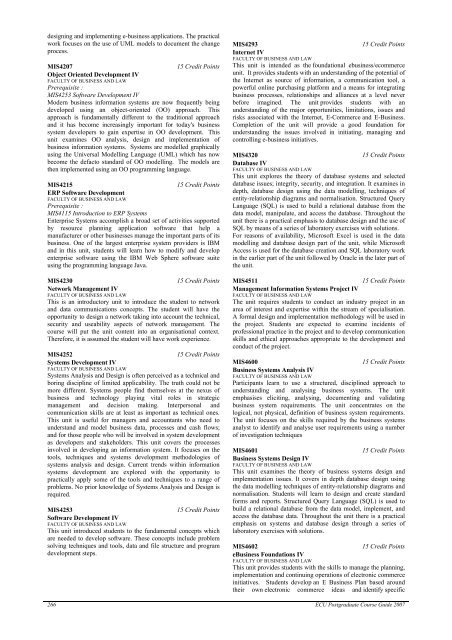Course Guide - Edith Cowan University
Course Guide - Edith Cowan University
Course Guide - Edith Cowan University
You also want an ePaper? Increase the reach of your titles
YUMPU automatically turns print PDFs into web optimized ePapers that Google loves.
designing and implementing e-business applications. The practical<br />
work focuses on the use of UML models to document the change<br />
process.<br />
MIS4207<br />
15 Credit Points<br />
Object Oriented Development IV<br />
FACULTY OF BUSINESS AND LAW<br />
Prerequisite :<br />
MIS4253 Software Development IV<br />
Modern business information systems are now frequently being<br />
developed using an object-oriented (OO) approach. This<br />
approach is fundamentally different to the traditional approach<br />
and it has become increasingly important for today's business<br />
system developers to gain expertise in OO development. This<br />
unit examines OO analysis, design and implementation of<br />
business information systems. Systems are modelled graphically<br />
using the Universal Modelling Language (UML) which has now<br />
become the defacto standard of OO modelling. The models are<br />
then implemented using an OO programming language.<br />
MIS4215<br />
15 Credit Points<br />
ERP Software Development<br />
FACULTY OF BUSINESS AND LAW<br />
Prerequisite :<br />
MIS4115 Introduction to ERP Systems<br />
Enterprise Systems accomplish a broad set of activities supported<br />
by resource planning application software that help a<br />
manufacturer or other businesses manage the important parts of its<br />
business. One of the largest enterprise system providers is IBM<br />
and in this unit, students will learn how to modify and develop<br />
enterprise software using the IBM Web Sphere software suite<br />
using the programming language Java.<br />
MIS4230<br />
15 Credit Points<br />
Network Management IV<br />
FACULTY OF BUSINESS AND LAW<br />
This is an introductory unit to introduce the student to network<br />
and data communications concepts. The student will have the<br />
opportunity to design a network taking into account the technical,<br />
security and useability aspects of network management. The<br />
course will put the unit content into an organisational context.<br />
Therefore, it is assumed the student will have work experience.<br />
MIS4252<br />
15 Credit Points<br />
Systems Development IV<br />
FACULTY OF BUSINESS AND LAW<br />
Systems Analysis and Design is often perceived as a technical and<br />
boring discipline of limited applicability. The truth could not be<br />
more different. Systems people find themselves at the nexus of<br />
business and technology playing vital roles in strategic<br />
management and decision making. Interpersonal and<br />
communication skills are at least as important as technical ones.<br />
This unit is useful for managers and accountants who need to<br />
understand and model business data, processes and cash flows;<br />
and for those people who will be involved in system development<br />
as developers and stakeholders. This unit covers the processes<br />
involved in developing an information system. It focuses on the<br />
tools, techniques and systems development methodologies of<br />
systems analysis and design. Current trends within information<br />
systems development are explored with the opportunity to<br />
practically apply some of the tools and techniques to a range of<br />
problems. No prior knowledge of Systems Analysis and Design is<br />
required.<br />
MIS4253<br />
15 Credit Points<br />
Software Development IV<br />
FACULTY OF BUSINESS AND LAW<br />
This unit introduced students to the fundamental concepts which<br />
are needed to develop software. These concepts include problem<br />
solving techniques and tools, data and file structure and program<br />
development steps.<br />
MIS4293<br />
15 Credit Points<br />
Internet IV<br />
FACULTY OF BUSINESS AND LAW<br />
This unit is intended as the foundational ebusiness/ecommerce<br />
unit. It provides students with an understanding of the potential of<br />
the Internet as source of information, a communication tool, a<br />
powerful online purchasing platform and a means for integrating<br />
business processes, relationships and alliances at a level never<br />
before imagined. The unit provides students with an<br />
understanding of the major opportunities, limitations, issues and<br />
risks associated with the Internet, E-Commerce and E-Business.<br />
Completion of the unit will provide a good foundation for<br />
understanding the issues involved in initiating, managing and<br />
controlling e-business initiatives.<br />
MIS4320<br />
15 Credit Points<br />
Database IV<br />
FACULTY OF BUSINESS AND LAW<br />
This unit explores the theory of database systems and selected<br />
database issues; integrity, security, and integration. It examines in<br />
depth, database design using the data modelling, techniques of<br />
entity-relationship diagrams and normalisation. Structured Query<br />
Language (SQL) is used to build a relational database from the<br />
data model, manipulate, and access the database. Throughout the<br />
unit there is a practical emphasis to database design and the use of<br />
SQL by means of a series of laboratory exercises with solutions.<br />
For reasons of availability, Microsoft Excel is used in the data<br />
modelling and database design part of the unit, while Microsoft<br />
Access is used for the database creation and SQL laboratory work<br />
in the earlier part of the unit followed by Oracle in the later part of<br />
the unit.<br />
MIS4511<br />
15 Credit Points<br />
Management Information Systems Project IV<br />
FACULTY OF BUSINESS AND LAW<br />
The unit requires students to conduct an industry project in an<br />
area of interest and expertise within the stream of specialisation.<br />
A formal design and implementation methodology will be used in<br />
the project. Students are expected to examine incidents of<br />
professional practice in the project and to develop communication<br />
skills and ethical approaches appropriate to the development and<br />
conduct of the project.<br />
MIS4600<br />
15 Credit Points<br />
Business Systems Analysis IV<br />
FACULTY OF BUSINESS AND LAW<br />
Participants learn to use a structured, disciplined approach to<br />
understanding and analysing business systems. The unit<br />
emphasises eliciting, analysing, documenting and validating<br />
business system requirements. The unit concentrates on the<br />
logical, not physical, definition of business system requirements.<br />
The unit focuses on the skills required by the business systems<br />
analyst to identify and analyse user requirements using a number<br />
of investigation techniques<br />
MIS4601<br />
15 Credit Points<br />
Business Systems Design IV<br />
FACULTY OF BUSINESS AND LAW<br />
This unit examines the theory of business systems design and<br />
implementation issues. It covers in depth database design using<br />
the data modelling techniques of entity-relationship diagrams and<br />
normalisation. Students will learn to design and create standard<br />
forms and reports. Structured Query Language (SQL) is used to<br />
build a relational database from the data model, implement, and<br />
access the database data. Throughout the unit there is a practical<br />
emphasis on systems and database design through a series of<br />
laboratory exercises with solutions.<br />
MIS4602<br />
15 Credit Points<br />
eBusiness Foundations IV<br />
FACULTY OF BUSINESS AND LAW<br />
This unit provides students with the skills to manage the planning,<br />
implementation and continuing operations of electronic commerce<br />
initiatives. Students develop an E Business Plan based around<br />
their own electronic commerce ideas and identify specific<br />
266 ECU Postgraduate <strong>Course</strong> <strong>Guide</strong> 2007



